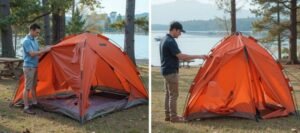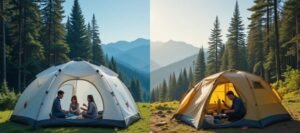Planning your first tent camping trip is an exciting milestone, but figuring out what to pack can feel overwhelming. The key to a successful trip is balancing comfort, safety, and simplicity. Overpacking can bog you down, while underpacking might leave you scrambling for essentials. This guide breaks down everything you need to bring for your first camping adventure so you can enjoy the great outdoors stress-free.
The Basics: Tent Camping Essentials
1. Your Tent and Accessories
Your tent is the cornerstone of your camping experience, so make sure it’s complete and suitable for your destination. Here’s what to include:
- Tent: Choose one with enough space for everyone plus gear.
- Rainfly: Protects your tent from rain and adds an extra layer of insulation.
- Tent Stakes: Bring extras in case some get bent or lost.
- Footprint or Ground Tarp: Protects the tent floor from wear and moisture.
Sleeping Gear for a Good Night’s Rest
A comfortable night’s sleep is crucial for enjoying your trip. Pack these items:
- Sleeping Bag: Choose one with an appropriate temperature rating for the weather.
- Sleeping Pad or Air Mattress: Provides insulation and cushions against the ground.
- Pillow: Bring a compact camping pillow or use a rolled-up jacket.
- Blanket: An extra layer for cold nights.
Cooking and Food Supplies
Preparing meals outdoors is one of the joys of camping, but it requires the right tools. Here’s what you’ll need:
- Portable Stove: A lightweight camping stove with fuel canisters.
- Cookware: A pot, pan, and kettle for boiling water.
- Utensils: Spatula, serving spoon, knife, and a can opener.
- Plates and Bowls: Lightweight, reusable options.
- Mugs and Cups: For coffee, tea, or other beverages.
- Cooler: Keeps perishable foods fresh.
- Reusable Food Containers: For storing leftovers or snacks.
- Biodegradable Soap and Sponge: For cleaning cookware and utensils.
- Trash Bags: Keep your campsite clean and follow Leave No Trace principles.
Clothing: Dress for the Elements
When camping, it’s vital to prepare for a range of weather conditions. Layering is the key to staying comfortable:
- Base Layers: Moisture-wicking shirts and thermal leggings.
- Mid Layers: Fleece or lightweight sweaters for insulation.
- Outer Layers: Waterproof jacket and pants.
- Hiking Shoes or Boots: Durable and comfortable for outdoor activities.
- Extra Socks and Underwear: Always pack more than you think you’ll need.
- Hat and Gloves: For warmth during cooler mornings or evenings.
- Sleepwear: Comfortable clothes designated for sleeping.
- Sunglasses and Sun Hat: Protect yourself from UV rays.
Personal Items and Hygiene
Even in the wilderness, basic hygiene is important. Pack these essentials:
- Toiletries: Toothbrush, toothpaste, and biodegradable soap.
- Towel: A quick-dry camping towel is lightweight and compact.
- Toilet Paper and Wipes: For use in remote areas.
- Hand Sanitizer: Keep your hands clean before meals.
- First Aid Kit: Include bandages, antiseptic wipes, pain relievers, and any personal medications.
- Bug Spray: Protects against mosquitoes and other pests.
- Sunscreen: Prevent sunburn with SPF 30 or higher.
Tools and Accessories
Having the right tools can make your camping trip smoother and safer:
- Multi-Tool or Knife: For cutting, repairing, or food prep.
- Flashlights and Headlamps: Bring extra batteries or rechargeable models.
- Lantern: Provides ambient light for your campsite.
- Rope or Paracord: Useful for setting up tarps, clotheslines, or emergency repairs.
- Duct Tape: Fixes rips, leaks, or broken gear temporarily.
- Map and Compass: Especially useful if you’re camping in remote areas with no cell service.
Food and Water Supplies
Fuel your adventure with the right provisions:
- Non-Perishable Foods: Canned goods, pasta, rice, and trail mix.
- Fresh Foods: Fruits, vegetables, and meats for grilling (keep these in a cooler).
- Snacks: Granola bars, nuts, and dried fruit for quick energy.
- Water: Bring enough for drinking, cooking, and cleaning. A gallon per person per day is a good rule of thumb.
- Water Filter or Purification Tablets: For trips where clean water isn’t readily available.
Entertainment and Extras
Camping is about enjoying nature, but a few extras can make your trip more fun:
- Books or Magazines: For quiet moments.
- Board Games or Cards: Perfect for evenings at the campsite.
- Binoculars: Great for birdwatching or stargazing.
- Camera or Smartphone: Capture memories, but don’t forget a portable charger.
- Notebook and Pen: Jot down observations or sketch your surroundings.
Safety Equipment
Safety should always be a priority when camping. Here’s what to bring:
- First Aid Kit: Include items for treating minor injuries and emergencies.
- Fire Extinguisher: Essential if you’re planning to have campfires.
- Bear Spray: In areas with wildlife, bear spray can be a lifesaver.
- Whistle: Useful for signaling in case of emergencies.
- Emergency Blanket: Lightweight and great for unexpected cold weather.
Tips for Packing Smart
- Organize Gear by Category: Use separate bags for sleeping gear, cooking items, and clothing to find things quickly.
- Pack Lightly: Stick to essentials to avoid overpacking.
- Double-Check Before Leaving: Go through your checklist one last time to ensure you haven’t forgotten anything.
Final Thoughts
Packing for your first tent camping trip doesn’t have to be overwhelming. With a well-organized checklist and the right essentials, you’ll be prepared to handle anything the great outdoors throws your way. Remember, the goal is to strike a balance between comfort and practicality while leaving unnecessary items at home.
Now that you know what to pack, it’s time to plan your adventure. Happy camping!
Reviewed and updated on 01/24/2025




